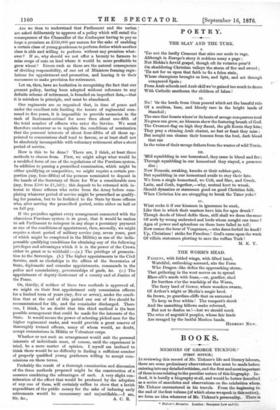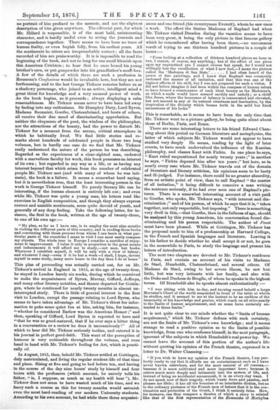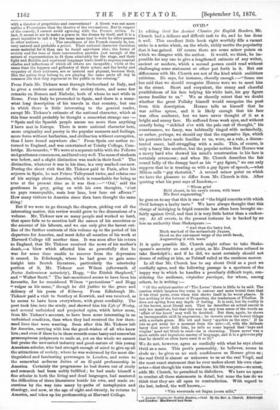BOOKS.
MEMOIRS OF GEORGE TICKNO1L1(
[FIRST NOTIC7E.] IN reviewing this record of Mr. Ticknor's life and literary labours, there are some preliminary observations that must be made before entering into any detailed criticism, and the first and most important of these is onerelating to the peculiar nature of this biography. In- deed, it is hardly a biography stall, and would be better described as a series of anecdotes and observations on the celebrities whom Mr. Ticknor encountered in his travels. From the beginning to the end of the first volume (of which alone we speak in this notice), we form no idea whatever of Mr. Ticknor's personality. There is
• Ticknor's Memoirs. London: Sampson Low and Co.
no portrait of him prefixed to the memoir, and not the slightest description of him given anywhere. The editorial part, for which Mr. Hillard is responsible, is of the most bald, uninteresting character, and is hardly useful even to string the journals and
correspondence together. There seems to have been no trace of human frailty, or even boyish folly, from his earliest years. All
the sentiments he utters are irreproachably correct ; all the facts recorded of him are praiseworthy. It is is impossible to read the beginning of the book, and not to long for one small blemish upon this American Crichton ; to hear that he once boxed his young
brother's ears, or put gunpowder into his grandfather's snuff-box. A few of the details of which there are such a profusion in Rousseau's Confessions would be invaluable here, but they are not
forthcoming; and to the last George Ticknor remains before us as a shadowy personage, who joined to an active, intelligent mind a great thirst for knowledge and a very unusual power of work. As the book begins, so it proceeds ; always displaying a calm reasonableness. Mr. Ticknor seems never to have been led away by feeling into any enthusiasm. Sir Humphry Davy, Lord Byron, Madame Recamier, Goethe, Chateaubriand, and hosts of others, all receive their due meed of discriminating approbation. But neither the eloquence of the poet, the wisdom of the philosopher, nor the attractions of the beauty, had the power to disturb Mr. Ticknor for a moment from the serene, critical atmosphere in which he habitually lived. We find little stories and re- marks about hundreds of celebrated people in these two long volumes, but in hardly one case do we find that Mr. Ticknor really understood the nature of the person he was describing. Regarded as the experiences of a clear-sighted man, endowed with a marvellous faculty for work, this book possesses an interest of its own ; but regarded in any way as a life, or as having any interest beyond that which arises from the number of celebrated people Mr. Ticknor met (and with many of whom he was inti-
mate), the book is a failure. It seems a somewhat hard saying, but it is nevertheless true, that the least interesting person in the work is George Ticknor himself. No purely literary life can be interesting, if the human element is entirely left out ; and even while Mr. Ticknor was quite a young man, his letters read like
exercises in English composition, and though they always express correct and amiable sentiments, seem quite devoid of youth, and generally of any deep feeling. Take the following letter, for in- stance, the first in the book, written at the age of twenty-three, to one of his own age :—
" My plan, as far as I have one, is to employ the next nine months in visiting the different parts of this country, and in reading those books and conversing with those persons from whom I can learn in what par- ticular parts of the countries I mean to visit I can most easily compass my objects. The whole tour in Europe I consider a sacrifice of enjoy- ment to improvement. I value it only in proportion to the great means and inducements it will afford me to study,—not men, but books. Wherever I establish myself, it will be only with a view of labour•, and wherever I stay—even if it be but a week—I shall, I hope, devote myself to some study, many more hours in the day than I do at home."
This plan of proceeding was actually carried out, for on Mr. Ticknor's arrival in England in 1815, at the age of twenty-four, he stayed in London barely six weeks, during which he contrived to make the acquaintance of Byron, Murray, Gifford, Jeffreys, and many other literary notables, and thence departed for Gottin- gen, where he continued for nearly twenty months in almost un- interrupted study. There is little of general interest in the first visit to London, except the passage relating to Lord Byron, who seems to have taken advantage of Mr. Ticknor's thirst for infor- mation to poke some quiet fun at him, asking him, for instance, "whether he considered Barlow was the American Homer ;" and then, speaking of Gifford, Lord Byron is reported to have said "that he was so good-natured, that if he ever says a bitter thing in a conversation or a review he does it unconsciously !" All of which to hear did Mr. Ticknor seriously incline, and entered it in his journal in perfect good-faith. This want of the perception of humour is very noticeable throughout the volume, and runs hand in hand with Mr. Ticknor's feeling for Art, which is practi-
cally oil. •
In August, 1815, then, behold Mr. Ticknor settled at Gottingen, duly matriculated, and living the regular student-life of that time and place. Rising at five and going to bed before ten, and having in the course of the day nine hours' study by himself and four hours with the professors (which amount, he naively tells his father, "is, I suppose, as much as my health will bear "), Mr. Ticknor does not seem to have wasted much of his time, and we fancy such a course as this for twenty months would astonish even the most hard-reading of our modern University students. According to his own account, he had while there three acquaint- ances and one friend (his countryman Everett), whom he saw once a week. The effect the Sistine Madonna of Raphael had when Mr. Ticknor visited Dresden during the vacation seems to have been very great, it being the only picture in that famous gallery which he remembered after having been there,—no uncommon result of trying to see thirteen hundred pictures in a couple of hours :—
"From looking at a collection of thirteen hundred pieces an hour of two, I cannot, of course, say anything; but of the effect of one piece upon my unpractised eye I cannot choose but speak, for I would not willingly lose the recollection of what I now feel,—I mean the picture called the 'Madonna di San Sisto.' . . . I had often heard of the power of fine paintings, and I knew that Raphael was commonly reckoned the master of all imitation, and that this was one of the highest efforts of his skill, but I was not prepared for such a vision. did not before imagine it had been within the compass of human talent to have formed a countenance of such ideal beauty as the Madonna's, on which a smile would have seemed earthly and unholy ; or a child like Jesus, where the innocence of infancy is consecrated and elevated, but not marred in any of its natural sweetness and fascination, by the inspiration of the divinity which beams forth in the mild but fixed. earnestness of his looks."
This is remarkable, as it seems to have been the only time that Mr. Ticknor went to a picture-gallery, he being quite silent about those of Berlin, Paris, and Rome.
There are some interesting letters to his friend Edward Chan-. fling about this period on German literature and metaphysics, the latter of which subjects Mr. Ticknor would not appear to have studied very deeply He seems, reading by the light of later events, to have much undervalued the influence of the Hamden. philosophy, and classes Kant with Fichte. In one place he says, "Kant ruled unquestioned for nearly twenty years ;" in another he says, "Fichte deposed him after ten years ;" but here, as in nearly every case where Mr. Ticknor travels out of the domain of literature and literary criticism, his opinions seem to be hasty and ill-judged. For instance, there could be no greater absurdity, from an artistic point of view, than to call Raphael "the master of all imitation," it being difficult to conceive a man writing the sentence seriously, if he had ever seen one of Raphael's pic- tures. There is a somewhat interesting account of a visit pakt to Goethe, who spoke, Mr. Ticknor says, "with interest and dis- crimination ;" and of his person, of which he says that it is," taken together, not only respectable, but imposing." There is something. very droll in this,—that Goethe, then in the fullness of age, should be analysed by this young American, his conversation found dis- criminating and his person reipectable. The author of Faust must have been pleased. While at Gottingen, Mr. Ticknor has the proposal made to him of a professorship at Harvard College, in the French and Spanish languages and literature. Leaving it. to his father to decide whether he shall accept it or not, he goea in the meanwhile to Paris, to study the language and present his letters of introduction.
The next two chapters are devoted to Mr. Ticknor's residence in Paris, and contain an account of his visits to Madame de Steel, Humboldt, Chateaubriand, and several others. Of Madame de Steel, owing to her severe illness, he saw but little, but was very intimate with her family, and also with the Duke and Duchess de Broglie, of whom he speaks in the highest. terms. Of Humboldt also he speaks almost enthusiastically :—
" I was sitting with him to-day, and turning round beheld a large. Mercator's Chart of the world suspended in front of the table at which he studies, and it seemed to me at the instant to be an emblem of the immensity of his knowledge and genius, which roach on all sides nearly to the limits of human acquirement, and on some have certainly ex- tended to those limits."
It is not quite clear to our minds whether the "limits of human- acquirement," which Mr. Ticknor defines with such certainty, are not the limits of Mr. Ticknor's own knowledge ; and it seems strange to read a positive opinion as to the limits of possible. knowledge, from one who confesses himself, in the next paragraph, ignorant of 'the subjects in which Humboldt's real power lay. We cannot leave the account of this portion of the author's life. without quoting his opinion of the French theatre, expressed in a. letter to Dr. Walter C'nanning
If you wish to have my opinion of the French theatre, I am per- fectly ready to say that it affords me an entertainment such as I have never known elsewhere, and for the most natural of all reasons,— because it is more cultivated and more important here; because it. enters much more deeply and intimately into the system of life, and. instead of being an accidental amusement, it is an every-day want. r do not speak now of their tragedy, which wants force and passion, and pleases me little; it has all the beauties of an inimitable diction, but as to the ordinary pretence of the French men of letters that it is the con- tinuation and perfection of the Greek, I think it entirely false. How, for instance, can they compare a theatre of which a story is related like that of the first representation of the Euntenides of Michylus
with a theatre of proprieties and conventions? A Greek was not more unlike a Frenchman than the theatre of the two nations. But in respect of the comedy, I cannot avoid agreeing with the French critics. In fact, it seems to me to make a genus in the drama by itself, and it is a great injustice to call it by the same name that is worn by other genera in other nations The excellence of the French comedy is, too, very natural and probable a priori. Their national character furnishes more material for it than can be found anywhere else ; the forms of society and the tone of their conversation partake just enough of the nature of representation to fit them admirably for the stage, and their light and flexible and equivocal language lends itself to express comical shades and inflections of which all others are incapable ; while at the Same time the foppery and gallantry of their actors, and the levity and coquetry of their actresses, are so natural and piquant, because they, like the nation they belong to, are playing the same parts all day in common life that they represent to the public in the evening."
From Paris Mr. Ticknor went through Switzerland to Italy, and he gives a curious account of the society there, and some few remarks on Bunsen and Niebuhr, both of whom he met while in Rome. From Italy he proceeded to Spain, and there is a some- what long description of his travels in that country, but one
in which there is little interesting to the general reader, except Mr. Ticknor's estimate of the national character, which at
this time would probably be thought a somewhat strange one " Spain and the Spanish people amuse me more than anything I have met in Europe. There is more national character here, more originality and poetry in the popular manners and feelings,
more force without barbarism, and civilisation without corruption, than I have found anywhere else." From Spain our author re- turned to England, and was entertained at Trinity College, Cam- bridge. He remarks, " We were at a separate table with the Fellows
and gentlemen commoners, and-fared very well. The mass of students was below, and a slight distinction was made in their food." The distinction, whatever it was in his time, is a very marked one now.
During the short visit that Mr. Ticknor paid to Paris, after his sojourn in Spain, he met Prince Talleyrand twice, and relates one of his sayings about America, which is remarkable for being as
true at the present time as it was then :—" Oui,' said the gentleman in grey, going on with his own thoughts, tc'est
tin pays remarquable, mais leur luxe, leur luxe est affreux !" How many visitors to America since then have thought the same thing !
But if we were to go through the chapters, picking out all the interesting matter, this review would grow to the dimensions of a volume. Mr. Ticknor saw so many people and worked so hard, that space fails us to mention half the names of his associates or the amount of his labours, and we can only give the barest out- line of the further contents of this volume up to the period of his departure for America, and must defer all mention of his work at Harvard College till another time. It was soon after his return
to England, that Mr. 'Ticknor received the news of his mother's death,—a blow which affected him so powerfully that he was for some time unable to recover from the depression it caused. in Edinburgh, where he had gone to gain some insight into Scotch literature, particularly the minstrelsy portion of it, Mr. Ticknor met Wilson (afterwards of .Noctes Ambrosian te notoriety), Hogg, "the Ettrick Shepherd," and "Walter Scott." The last-mentioned seems to have been his favourite, for he considered Wilson " pretentious " and Hogg 41 vulgar as his name," though he did justice to the grace and delicacy of his poem of Kilmeny. From Edinburgh Mr. Ticknor paid a visit to Southey at Keswick, and was received, as he seems to have been everywhere, with great cordiality. The poet took him into the study, and showed him his Life of Wesley,
and several unfinished and projected epics, which latter seem, from Mr. Ticknor's account, to have been more interesting in an unfinished condition, than when they had received the few thou- -sand lines that were wanting. Soon after this Mr. Ticknor left for America, carrying with him the good-Wishes of all who knew him; and even if there be in these records some hasty and somewhat presumptuous judgments to smile at, yet on the whole we cannot but praise the unwearied industry and good-nature of this young American scholar, who had strength enough of mind to give up all the attractions of society, where he was welcomed by the most dis- tinguished and fascinating personages in London, and retire to -the somewhat arduous duties of an ill-paid professorship in America. Certainly the programme he had drawn out of study and research had been nobly fulfilled ; he bad made himself a line scholar in both the living and dead languages, had mastered the difficulties of three literatures beside his own, and made ex- cursions by the way into many by-paths of metaphysics and theology, and now, at the age of eight-and-twenty, he returns to America, and takes up his professorship at Harvard College.
































 Previous page
Previous page